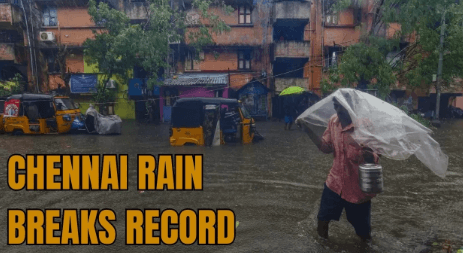Chennai: The city experienced significant rainfall on Friday night, with both the Nungambakkam and Meenambakkam observatories recording 4 cm of rain each. The India Meteorological Department (IMD) has forecast further rainfall of light to moderate intensity over the next two days, prompting weather bloggers to predict a potentially record-breaking July for Chennai.
Since the beginning of July, Nungambakkam has accumulated around 17 cm of rainfall, while Meenambakkam has received approximately 15 cm. This heightened rain activity is largely attributed to convection triggered by opposing wind patterns and heat over the land. Additionally, July is typically a month characterised by thunderstorms in Chennai and its surrounding suburbs. The continuous rainfall has led to a noticeable drop in daytime temperatures. On Saturday, temperatures were recorded at 33°C in Nungambakkam and 33.2°C in Meenambakkam, which is roughly 2.7°C and 2.6°C below the seasonal norm, respectively. According to the IMD, the city and its suburbs are likely to experience more light to moderate rainfall, with some areas potentially witnessing thunderstorms and lightning over the next 48 hours. The skies are expected to remain partly cloudy, with maximum temperatures ranging between 33°C and 34°C, and minimum temperatures between 25°C and 26°C.
This unprecedented rainfall surge could see Chennai surpass its historical rainfall records for July, significantly impacting the city’s infrastructure and daily life. While the increased rainfall is beneficial for replenishing water reservoirs, it also raises concerns about urban flooding and associated challenges. Residents are advised to stay informed about the weather conditions and take necessary precautions, especially in flood-prone areas. The authorities are closely monitoring the situation and are expected to provide timely updates to ensure public safety. The city’s ability to manage this significant rainfall will be a testament to its preparedness and resilience against increasingly unpredictable weather patterns. The ongoing monsoon season and the subsequent rainfall data will be crucial in understanding broader climatic trends and preparing for future weather events. Chennai’s handling of this situation will highlight its capabilities in managing extreme weather conditions, setting a benchmark for urban resilience.


